The Library of Congress hosted a public discussion on Congress.gov on September 18, 2024, the fifth such forum it has held. You can watch video of the forum or read the Library of Congress’s summary of the discussion. We published a summary of prior forums from 2023, 2022, 2021, and 2020. They are held pursuant to direction from Congress, which required the Library of Congress to meet with the public concerning access to data from Congress.gov. More than fifty people attended in person and 400-500 people were expected to participate online.
As we noted last year, the format of these forums is a missed opportunity even as we welcome and appreciate the high level folks who give presentations at these meetings. The purpose of the meetings is for the public and the Library to have a discussion about the public’s data needs for information that relate to Congress.gov and how/whether to meet those needs. What we have now are lengthy presentations from officials about their accomplishments and the sidestepping of questions about what additional services or resources the Library could provide.
The greatest sensitivity is around information that is “owned” by the Congressional Research Service. That team gives a presentation in a format that is designed to avoid any questions from the public.
The Library does generate an annual report to appropriators concerning the requests made by the public at these forums, including what would be involved to meet those requests. That report is not publicly available and the Library has declined to discuss their analysis of costs and recommendations. Appropriators have directed the Library to release these reports to the public, but that language was included in the FY 25 appropriations bill that has yet to be enacted into law.
Public Q&A
Looking over my notes, there were not many noteworthy announcements to discussion. Here are the ones that seem most relevant:
Members of the Congressional Data Task Force are creating a data map of who has custody of which data and where are the authoritative sources.
The Senate is exploring how to provide roll call vote data to the Library of Congress via an API.
The House is exploring how to transform committee votes and make them available as data.
GPO is working to digitize and scan the statutes at large. First digitize, then add metadata.
The Government Publishing Office announced they completed a cross-organizational project to model the remaining bill versions, resolutions, and amendments. USLM version 2.1 is available online.
The House and Senate are looking at how to update the codes and more closely track and possibly disclose legislative actions.
The Constitution Annotated website is a big success, and what was not noted was public requests that it be published online for more than a decade.
A number of improvements were made to the congress.gov API. There’s ongoing work to create new endpoints to filter members by state + district, by Congress date, amendment. The number of requests per hour was increased to 5k. The Library is also beginning an effort to produce committee authority records for standing committees terminated prior to 1973. The API is receiving 20-40m hits per month.
The Library affirmed that CRS reports would be made publicly available in HTML by March. The Library declined to address longstanding requests for the back catalog of CRS reports or to better integrate those reports with the Congress.gov website.
A question was asked but not addressed on ensuring that bill text and report language concerning appropriations is made publicly available on Congress.gov. The answer was that CRS has editorial control, which doesn’t answer the question of whether the Library/CRS would be willing to include legislation and report language published by the appropriations committee but not yet provided to GPO.
The Library declined to share its internal roadmap for features that are requested, whether in part or in full. The public expressed a desire to help the Library prioritize. Congressional requests get top priority.
The Library of Congress said it still was not ready to release a report on whether bill summaries could be generated by AI, but would release a report later that year.
There was no answer to the question of whether the Library would incorporate floor proceedings on its schedule.
There was no answer on whether the identification of related GAO reports for upcoming hearings is a conversation that is continuing.
